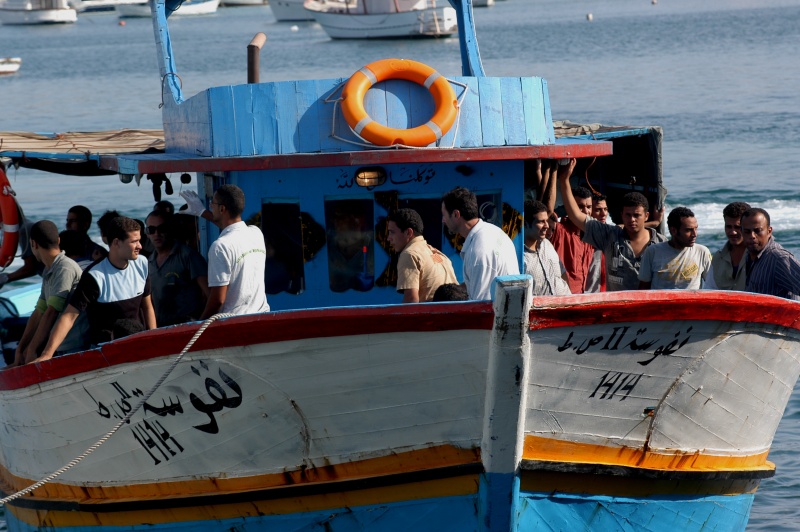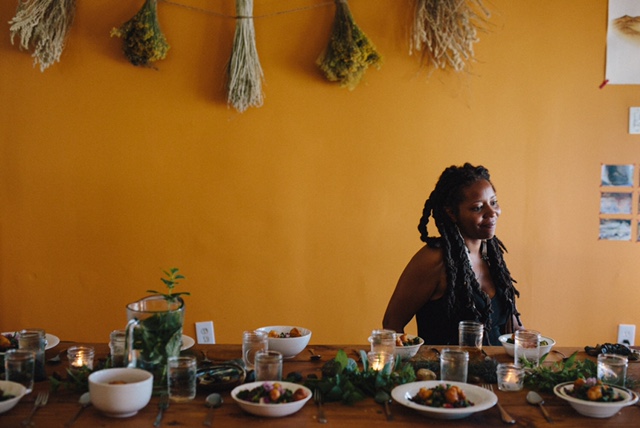In this post, Rachel Unkovic, member of the 2016 cohort, talks about why oral historians have a unique role to play in amplifying and signal boosting marginalized voices to enable "history" and communal memory to be appropriately critiqued.
Read MoreThe Utopia of Europe
"lampedusa" (CC BY 2.0) by noborder network.
Alliance for Historical Dialogue and Accountability fellow Lura Limani reflects on what stories of migrants, as collected by Professor Luisa Passerini’s Bodies Across Borders in Europe project, can teach us about European identity.
Read MoreRecognition of Multi-Truth in an era of Post-Truth
In this post, OHMA student Tomoko Kubota (2017) explores how we can make meaning of oral history in an era of Post-Truth. This article is the first in a three-part series exploring Dr. Luisa Passerini’s recent OHMA Workshop Series lecture, “Interviewing Artists: Intersubjectivity and Visuality.”
Read MoreThe Identity of an Oral Historian
In this post, current OHMA student Shira Hudson reflects on how Mi’Jan Celie Tho-Biaz’s lecture inspired her to consider what it means to identify as an oral historian.
Read MoreFirst, Take Care of Yourself Thoughts on Storytelling and Wellness
In this post, Robin Weinberg, member of the 2016 cohort, talks about how we, as story collectors, oral historians and engaged listeners, need to make sure we have an toolbox of techniques to take care of ourselves.
Read MoreI Don’t Need to Be the Expert of All Those Other Things
Photo credit: Ali Lapetina
Shot onsite during 2017 Burnside Farm artist residency in Detroit, Michigan (with permission/gratitude to Kate Daughdrill, Burnside Farm founder).
In this post OHMA student Elly Kalfus (2017-2018) discusses how Mi’Jan Celie Tho-Biaz’s approach to designing and facilitating oral history storytelling events led her to a deeper understanding of the value of collaboration and humility.
Read MoreFrom Individual Experience to Political Expression: A Discussion of How Specific Experiences Are Presented in Movements
In this post, current OHMA student Monica Liuting (2016) reflects how Terrell Frazier uses oral history interviews to frame personal experiences in political expressions. This article is the last in a four-part series exploring Terrell’s recent OHMA Workshop Series lecture, “Becoming an Organizer: Narrative, Identity and Social Action.”
Read MoreDecolonizing the Academy through Collaboration
From the American Museum of Natural History, here is a photo of Tsukwani and George Hunt, two members of the clan who were in communication with anthropologist Franz Boas during his ethnographic study of the Kwakwaka’wakw. Courtesy of: http://www.firstnations.eu/fisheries/kwakwakawakw-kwakiutl.htm.
In this post, OHMA student Dina M. Asfaha (2016) discusses how we can make meaning of and interrogate anthropology using oral history. This article is the final in a three-part series exploring Dr. Leslie Robertson’s recent OHMA Workshop Series lecture, “Devalued Subjectivities: Disciplines, Voices and Publics.”
Read MorePresenting History in Political Limitation: Disciplines and the Truth
In this post, current OHMA student Yutong Wang (2016) discusses her perspectives on being a historian and how politics influence historical revisionism. This article is the second in a two-part series exploring Dr. Leslie Robertson’s recent OHMA Workshop Series lecture, “Devalued Subjectivities: Disciplines, Voices and Publics.”
Read MoreThe Politics of (Mis)recognition
Robertson shows a slide of a photograph of anthropologist Franz Boaz in which she points out how Boaz was “literally holding up a blanket to cover a white picket fence behind him.” By covering the fence, Boaz tried to recreate the world he imaged, a wilderness perhaps, before European contact. By contextualizing her voice and the voices of the people involved in the representation of Cook, Robertson’s approach offered guidance as to how understanding forms of social knowledge within politically and culturally sensitive contexts is essential to how we see ourselves in relation to one another.
In this post, OHMA student Elyse Blennerhassett (2016) discusses how Dr. Leslie Robertson’s community-generated and collaborative methodologies inform her own practice in working with communities who are politically marginalized and stigmatized in the criminal justice system. This article is the first in a two-part series exploring Dr. Robertson’s recent OHMA Workshop Series lecture, “Devalued Subjectivities: Disciplines, Voices and Publics.”
Read MoreThe Dialogic Space & Feeling the Human Story: Reflections on 'Below the Grid' (Part I)
Image courtesy of pixabay.com
In this post, Chinonye Alma Otuonye explores the dialogic space as a mechanism towards a human understanding of the self and history. She reflects on the ways John Kuo Wei Tchen—NYU professor, historian, and curator—decolonizes both space and history within and through his work.
This article is the first in a three-part series exploring Tchen’s recent OHMA Workshop Series lecture, “Below the Grid.”
Read MoreOn Citizenship, Voice, and Motherhood
In this article, Fanny Garcia (2016) reflects on her path to oral history through her family’s path to naturalization, her transformation of xenophobia through activism, and the recent Central American refugee crisis that spurred her mother to share her story.
Read More










